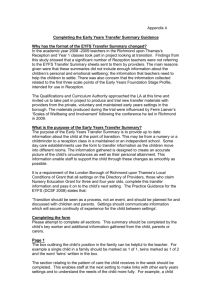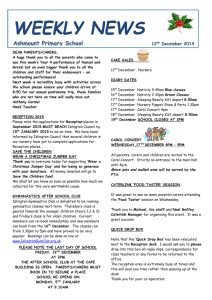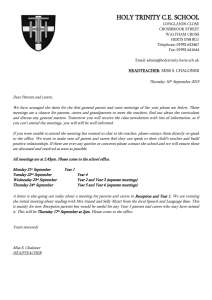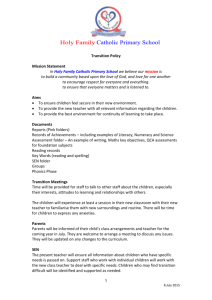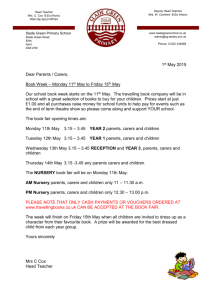00 Early Years Foundation Stage Policy January 2014
advertisement
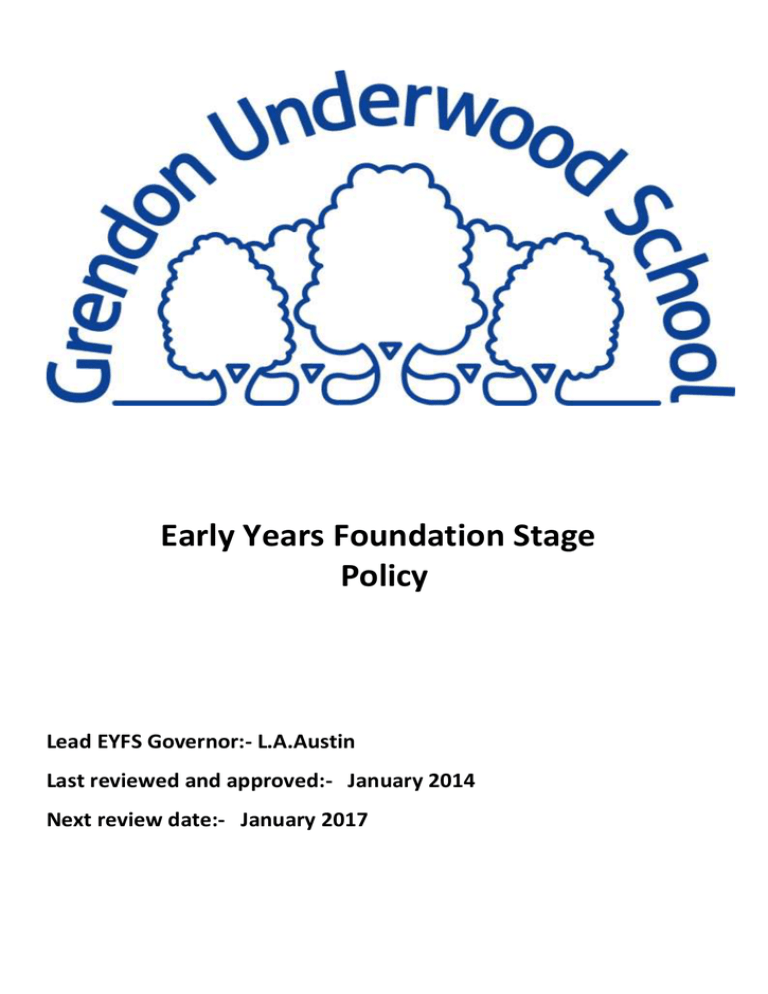
Early Years Foundation Stage Policy Lead EYFS Governor:- L.A.Austin Last reviewed and approved:- January 2014 Next review date:- January 2017 Every child deserves the best possible start in life and support to fulfill their potential. A child’s experience in the early years has a major impact on their future life chances. A secure, safe and happy childhood is important in its own right, and it provides the foundation for children to make the most of their abilities and talents as they grow up. When parents choose to use Early Years services they want to know that provision will keep their children safe and help them to thrive At Grendon Underwood School our Foundation Stage 1 and 2 classes (Nursery and Reception) work closely together to provide quality provision for the children in our care. The Aims of the Early Years Foundation Stage at Grendon Underwood School are: To provide a broad and balanced curriculum which embraces the themes, principles and commitments of the Early Years Foundation Stage and the seven areas of learning in the Early Years Foundation Stage To provide a happy, secure, stimulating and challenging environment. To provide opportunities for children to make choices which will facilitate independent learning, creative thinking and enable them to feel confident as learners. To provide opportunities for children to develop their communication, linguistic, investigative and problem solving skills through interaction with adults and other children. To promote children’s imagination in play through stimulating resources and activities within the inside and outside classrooms. To develop a partnership with parents/carers based on a shared understanding of the learning needs of the children. To provide quality first hand, play based learning experiences that are well planned and contain an appropriate balance between different types of play, permeating all aspects of the curriculum. To provide a range and balance of child initiated, adult initiated and adult focused activities indoors and outdoors. To provide a smooth transition between the Early Years Foundation Stage and Key Stage 1 – Year 1. In the Early Years Foundation Stage at Grendon Underwood School we believe: That all children in our care have an entitlement to a broad and balanced curriculum (irrespective of learning needs, race, colour, gender, cultural/social background, or religious persuasion). That what each child can do is the starting point of his/her learning. That how we provide for and interact with children has a profound effect on their well-being and learning. That information provided by parents/carers is valued and seen as a vital link in forming a partnership with families and in building a picture of each child. That the Early Years Foundation Stage is the springboard to a good start in their education at school. That play is a major vehicle through which young children learn and gain access to all aspects of the curriculum. Play is a natural process. It puts children in charge of their own learning. It helps children to make sense of their world and enables them to develop their personal qualities, attitudes and higher order learning. That children learn more effectively in a lively, rich and stimulating environment with opportunities to access all areas of the curriculum indoors and out. Essentially we want children to make decisions, become independent learners, interact with people, enjoy learning and become confident with themselves, others and our world. Guidelines In providing a basis for our Early Years Foundation Stage Policy we have discussed and evaluated the following areas: Staffing Indoor/outdoor provision Learning environments The revised Early Years Foundation Stage curriculum and planning Observation, assessment, record keeping and target setting Partnerships with parents and families Ofsted Admissions Transition from our Nursery Class to Reception Class and from Reception to Year 1 Staffing Staff knowledge and expertise is seen as a prerequisite for an effective Foundation Stage department and this is accomplished by: Foundation 1 and 2 staff working closely together so that knowledge and expertise is shared by all parties. Members of the team keeping abreast of relevant research and information. Staff attending in-service courses, conferences and support group meetings. Ensuring that the Nursery Leader and EYFS Leader have appropriate training and experience with knowledge of child development and the Early Years. They will have the ability to structure and support young children’s learning, lead and manage the team and work closely with other agencies. Planning the Early Years Foundation Stage curriculum Learning experiences are planned for both indoor and out and are linked together through topic work which encompasses seven areas of learning. The ‘Prime Areas’ of learning, focussed on initially within Nursery (building links to the ‘Specific Areas’ below)are Communication and Language Personal, Social and Emotional Development Physical Development The ‘Specific Areas’ of learning, focussed on equally alongside the Prime Areas within Reception, are Literacy Mathematics Understanding the World Expressive Arts and Design Indoor /outdoor environments The indoor environment will have:Labeled areas for:Creative area, investigation area, malleable materials area, mark making/writing area, construction area, small world area, mathematics area, role play, ICT provision/computer area, quiet reading corner, sand and water play. The outdoor environment will have:Provision for:Creative opportunities, exploring and investigating, small world play, writing/mark making opportunities, mathematical opportunities, role play, quiet area, physical play areas, including wheeled toys, large scale sand and water play. Planning Each Year Group considers how to provide for the children using three stages of planning Long term:This is informed by the Development Matters statements and Early Learning Goals the children need to meet in their development. Continuous Provision plans show how each area of the environment supports the children’s learning. Medium term:These plans cover the half term topic work each year group will deliver. They include the details of possible learning activities and opportunities in each of the 7 areas of learning indoors and out. Short term:The weekly plans for each year group identify the learning intentions/outcomes to be taught along with evaluations linked to the activities provided. The needs of individual learners, based on observations, are catered for within this framework. Learning objectives are differentiated so that the able are challenged and those that need additional help are supported. Gifted and able pupils will be identified through formative assessment in sessions. Pupils who show high levels of ability or talents in specific areas of the curriculum will be included on the Grendon ‘Hercules’ gifted and talented register and will be appropriately differentiated for in lessons. Transitions In the Summer Term, children in both Nursery and Reception begin activities to support their transition to their next classes. A structured programme of activities and events begins to expose the children to experiences from their next school year to support a smooth transition. Activities undertaken will include: Learning walk- children walk through their new year group classrooms with their current teaching staff. Story time- children visit classes in the new year group for stories and rhymes. Teacher swaps- teachers from other year groups visit classes to get to know the children. The children’s next classes will involve more adult led and adult initiated activities, alongside some outdoor and child initiated ones. The balance of activities will be adapted to suit the needs of the particular cohort, but the aim is to extend children’s concentration through more focused sessions. Observation, Assessment and Record Keeping Learning Journeys are used to record the learning that occurs over the children’s time in Nursery and Reception classes. Nursery Learning Journeys include: Settling in observations during the first half term Learning stories and extended observations including annotated photographs of child initiated learning Annotated photographs of group activities such as cooking, Christmas party Evidence of play and learning at home Samples of e.g. mark making Grids highlighting children’s progress in the areas, based on Development Matters Statements and linked to the Early Years Foundation Stage Profile Reception Learning Journeys include Photographs, particularly those demonstrating the process of learning Individual observations, both planned and on the spot Grids highlighting children’s progress in the areas, based on Development Matters Statements and linked to the Early Years Foundation Stage Profile Reading records, Literacy and Numeracy books / work IEP’s (if applicable) End of term and year comments based on areas and seen by parents Evidence of play and learning at home Foundation Stage Entry Profile Partnerships with parents and families In the Early Years Foundation Stage we believe that partnership with parents and families is paramount. To develop this partnership we provide the following opportunities: Visits to school: All Nursery and Reception children and parents/carers are invited to meet their teacher and their class prior to their admission. An objectives meeting for Nursery and Reception parents/carers is held in the Summer term, prior to the children starting in the class in September. Parents/carers are invited to come to a range of events through the year including the Harvest Festival, Christmas performances, Easter Bonnet Parade and Sports Day. Nursery have a 10 minute ‘open door’ policy where parents are welcome to stay for 10 minutes at the beginning of each session to see how their child settles in and interacts in the environment. Reception hold ‘drop in’ sessions where parents and carers can visit the classroom to see what has been happening, look at the children’s Literacy and Learning Journey books and have an informal chat with the class teachers. Open Mornings are offered for parents and carers to visit for a morning to see how the class runs in a ‘normal session’, interact with their children at play and then have the opportunity to ask questions about what they have seen in a question and answer session. Meetings with parents: Foundation Stage staff are available to speak to parents/carers before and after school for Nursery and Reception. Reception have a parent/teacher consultation meeting in the Autumn and Spring Terms. There is a Foundation Stage open day for parents and carers to come and visit their child’s new class and find out about what happens in a day. Information sharing: Internet user agreements are issued when a child starts school Home/School Agreements are issued when a child starts school. Parents/carers are encouraged to become involved in their child's learning, (e.g. supporting their child at home with reading letter sounds). Nursery and Reception reports go out in the summer term, with a brief report in Autumn and Spring A questionnaire is sent out to Foundation Stage parents/carers. Half termly Home Guides are sent out to inform parents/carers about the activities and topics that are being covered. Admissions The school’s admission arrangements are as described by the Buckinghamshire Education Authority for all County schools. Arrangements for Admission to the school should be made either directly to the school or through the Education Authority Office, County Hall, Aylesbury, Bucks, HP20 1UZ. Reviewed and approved January 2014 Next review date: Spring Term 2017 or as necessary if admission arrangements etc change

